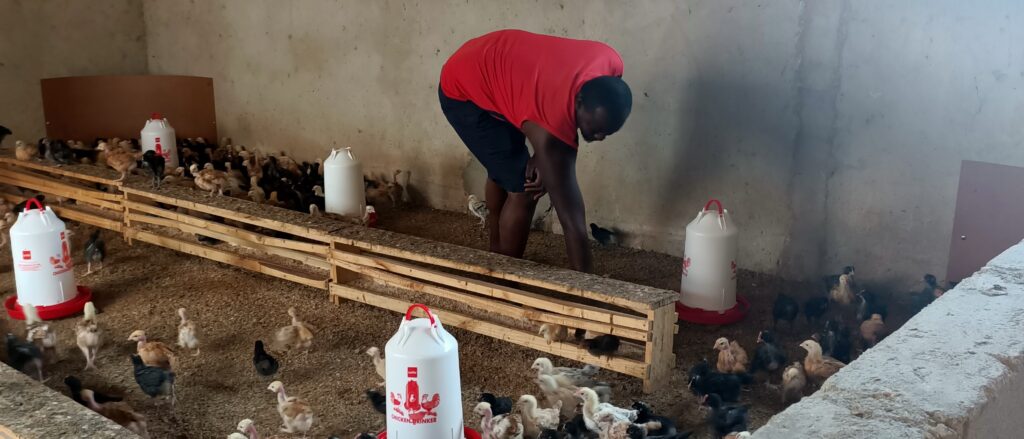How one man’s dream is supporting generations
When we meet Moses Kuppa in the outskirts of Iringa town in the southern highlands of Tanzania, his chicken farm is a hive of activities. Two farm hands are busy cleaning the various poultry houses and feeding the more than two thousand chickens. Occasionally, traders arrive at his gate on motorbikes looking to purchase chickens from the farm. At 36-year-old, Moses has accomplished what many small-scale livestock producers aim to achieve, generating a steady income from their produce. But for the father of one, the journey has not been easy. Sheer hard work, passion and knowledge of his trade has contributed to his success as an entrepreneur.
Moses started his chicken business back in 2013 with only a few chicks. As with any young business, there were challenges along the way, including having to deal with various poultry diseases that threatened to wipe his entire flock and cut his dreams short. But with time, he gained the knowledge and experiences needed to run a successful poultry farm. Key among the game-changers for his business is hatchery vaccinations. Moses buys his day-old chicks from Silverlands Tanzania, a hatchery that produces high quality poultry feed and day-old chicks which are then sold to smaller businesses and other farmers across the East Africa region. All day-old chicks from Silverland are fully vaccinated from various poultry diseases which gives the farmers peace of mind.
In addition, Silverlands also runs a poultry training college, and it is through these trainings that Moses learned how to properly run his business and deal with challenges such as biosecurity, which is the weakest link for many small-scale poultry farmers.
“We follow all the right processes of production that we have been taught, from feeding, vaccinations and even avoiding mixing the different ages of chickens so that there is no cross-termination.” He says.
Moses then sells his chick from seven weeks old up to nine weeks old to other smaller-scale producers and businesses around. He is what is called a mother-unit, meaning other farmers buy chicks from him to rear and sell to supermarkets, restaurants and even to neighbours for home consumption and social gatherings. By selling his chicks at such a young age, Moses saves on the cost of rearing the chicks to fully grown ages. “Other farmers sell at three months at the same price that I do but having spent a lot extra on the cost of feeds, heating and other essentials,” says Moses.
What Moses has been able to accomplish with his profits is clearly visible. He has built a big family house and at the back, he has constructed modern chicken houses that can house over 2,000 chicks, separated by ages. He also built extra rooms for his relatives who depend on him and help him on the farm.
“My house is built with income from my chicken business. I am no longer renting. Even though I double a bit on crop farming, much of my income comes from my chicken business. I also stay with my brother’s child and other family members who look up to me as their provider.” Says Moses.
A bigger business
But for Moses, this is just the beginning.
“I have big dreams for this business. I want to own a big enterprise and to start exporting chicks regionally. This is my long-term goal.”
In April 2021 GALVmed and animal health company Ceva Santé Animale launched PREVENT (PRomoting and Enabling Vaccination Efficiently, Now and Tomorrow), an initiative that will work with medium-size hatcheries in target countries to annually distribute more than 50 million vaccinated day-old-chicks to farmers such as Moses.
These chicks will be effectively protected against the major infectious poultry diseases thereby improving overall flock health and boosting small-scale producers’ financial prospects.
Written by Beatrice Ouma, GALVmed Senior Communications Manager



